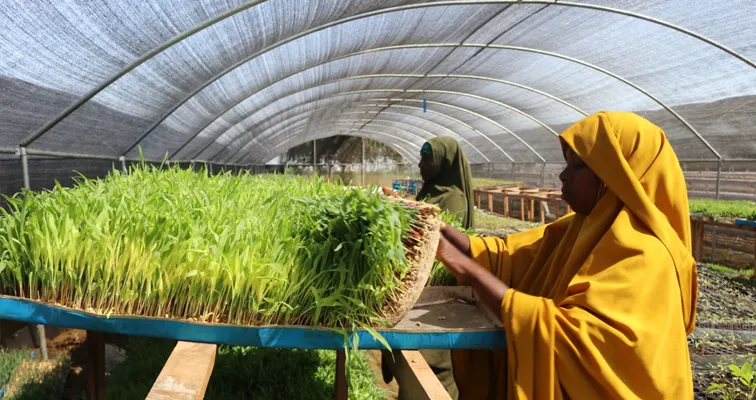Climate crisis driving child-family separation: More action needed

In 2024, the planet experienced its hottest year on record, for the first time global temperatures exceeded the critical 1.5°C threshold in a calendar year. The warming trend continues in 2025, posing growing risks to children and families worldwide.
Our recently published Global Report on Children’s Care and Protection states that the climate crisis is one of the world’s major causes of child-family separation. According to UNICEF’s Children’s Climate Risk Index, nearly half of the world’s children, approximately one billion, live in extremely high-risk countries.
Extreme weather events like droughts and floods deepen poverty and strain social protection systems, often forcing families to migrate or become displaced, putting children at increased risk of losing parental care.
The climate crisis is also accelerating the frequency of environmental shocks. In parts of the Horn of Africa, for instance, communities have faced prolonged droughts followed soon afterwards by extended flooding.
Families on the edge
A collapse in agricultural productivity means families can no longer provide for themselves. Trapped in poverty, they are often driven to desperate measures.
Some communities turn to early and forced child marriage as a way of reducing the number of mouths to feed, which can lead to other harmful practices such as female genital mutilation.
Extreme weather and displacement often prevent children from pursuing an education due to destruction or lack of access. Some families trek for days to reach safety, often without adequate food or water. Strained resources and cramped spaces in camps for displaced families can lead to disease outbreaks, despair and violence.
Floodwaters destroy livelihoods
Dr. Dimbil Deqa, SOS Children’s Villages Regional Emergency Response Programs Advisor for Eastern and Southern Africa, recalls a family with five children in southern Somalia who walked 80 kilometres to the nearest town after floods destroyed their farmland. The father had to figure out how to earn a living in an unfamiliar place, while their newborn son contracted neonatal sepsis, a life-threatening infection, in the camp meant to protect him.
“They've had this small, happy family life in the country,” says Dr. Deqa, “but now that's gone. They've survived the crisis, but it has completely upended their existence, their way of life, their future, and what they expected from the world. It's a crisis within a crisis.”
Between 2022 and 2023, SOS Children’s Villages responded to 30 climate-induced disasters in Africa, Asia and Latin America, including the floods in Pakistan that affected 30 million people, and the prolonged drought in the Horn of Africa.
SOS Children’s Villages provides immediate support
Whether evacuating families ahead of disasters or providing child-friendly spaces in their aftermath, SOS Children’s Villages adapts its support to meet urgent needs.
In Brazil, children, families and staff were relocated from Porto Alegre one day before floodwaters hit in May 2024. Later in the year, new homes were built for some of the affected families.
In Kenya, floods displaced more than 280,000 people, damaged farmland and destroyed nearly 10,000 livestock, infrastructure, businesses, schools, and healthcare facilities. SOS Children’s Villages provided food, cash transfers, medical outreach clinics, and a temporary centre in Kisumu for children who were separated from their families.
Sustainable farming for long-term resilience
Many of Somalia’s 2.8 million internally displaced persons were previously farmers. Persistent droughts have devastated their livelihoods, threatening their survival. Soil preservation and water conservation are significant challenges. SOS Children’s Villages Somalia’s programs incorporate youth employability, green-skilling and income generation, as young people run the farms using non-corrosive agricultural practices.
“By introducing climate-smart farming technologies, we are helping communities in Somalia withstand climate shocks and empowering them to rebuild their livelihoods sustainably,” says Bashir Said, Program Director, SOS Children's Villages Somalia.
In Badoa, local farmers participating in the Bonkay Smart Farms project harvested 115 kg of eggplants for the first time. The initiative supports 200 households, helping families move beyond survival toward sustainable growth and self-sufficiency.
“These innovations are crucial in tackling hunger and poverty, ensuring families have the resources they need to thrive despite the challenges of climate change,” Mr. Said adds.
In Zambia, hydroponic farming introduced by SOS Children's Villages means families no longer need to fear droughts or heavy rainfall or need pesticides. Food insecurity has been eliminated. Young people are learning these new methods in preparation for the green jobs of the future.
Putting children at the heart of climate action
In 2019, the United Nations acknowledged that the climate crisis contributes to the unnecessary separation of children from their families. Yet as of 2021, only 34 percent of national climate action plans were child-sensitive. This must change.
Urgent investments are needed in effective child protection mechanisms:
Economic empowerment: Help families develop alternative income-generating skills.
Social services: Ensure systems for health, nutrition, water, housing, education, and child protection function despite environmental stresses.
Social protection: Expand measures like cash transfers, school meals, and support for families' access to services to alleviate economic hardships.
Community-led solutions for a sustainable future
Early warning systems improve climate preparedness, but local communities must be at the centre of planning.
Empowering communities, especially young people, is essential to building long-term climate resilience. The SOS Children’s Villages Youth Power initiative enables young people from SOS programs to lead projects aligned with the Sustainable Development Goals. By supporting their growth as changemakers, the initiative has provided mentoring, funding, and training to more than 1,000 youth worldwide.
Youth developing green skills is essential for a successful transition to the green economy. This is particularly important for young people leaving alternative care, as employment strengthens their ability to lead independent, self-determined lives with dignity.
By addressing the climate crisis, the world can disrupt the intergenerational cycle that puts children at risk of losing parental care. Instead of neglect, abandonment and despair, children can grow up with the bonds they need to thrive.
